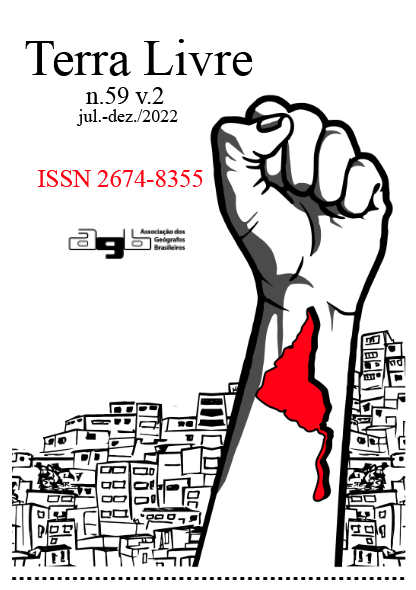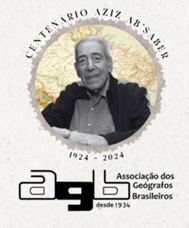SOCIAL CARTOGRAPHY: TERRITORIAL PERCEPTIONS AND ETHNIC IDENTITY OF THE MUNDURUKU PEOPLE OF THE PLANALTO IN SANTARÉM-PARÁ
percepções territoriais e identidade étnica do povo Munduruku do Planalto em Santarém-Pará
DOI:
https://doi.org/10.62516/terra_livre.2022.2905Keywords:
Munduruku people, Territory, Social Cartography, StruggleAbstract
To understand the territorial, cultural perceptions and understand the territorialities that are put in tension by the expansion of the agricultural frontier in the western region of Pará. This article aims to analyze the booklet “Territorio Munduruku do Planalto Santareno”, produced in 2015 by the New Social Cartography of the Amazon Project. This territory comprises the villages of Açaizal, Amparador, Ipaupixuna and São Francisco da Cavada, located in floodplain areas on the right bank of the Amazon River and on dry land, close to the Santarém Curuá-Una Highway, PA-370. It is a research with a qualitative approach, of document analysis of the PNCSA fascicle, with support in oral history through interviews with indigenous leaders to understand the occupational process of the territory and understand the relations of disputes. It is understood that social cartography played a fundamental role in understanding the construction of territory and territorialities, especially in questions of ethnic affirmation that became a factor of resistance, remained and struggle for territory, mainly from 1990 when they began to assert themselves as indigenous people,
Downloads
References
ACSELRAD, Henri. Mapeamentos, identidades e territórios. Cartografia social e dinâmicas territoriais: marcos para o debate / Henri Acselrad (organizador) ; Aurélio Vianna Jr ... [et al.]. – Rio de Janeiro : Universidade Federal do Rio de Janeiro, Instituto de Pesquisa e Planejamento Urbano e Regional, 2010
ALMEIDA, Alfredo Wagner Berno de Terra de quilombo, terras indígenas, “babaçuais livre”, “castanhais do povo”, faixinais e fundos de pasto: terras tradicionalmente ocupadas. Alfredo Wagner Berno de Almeida. – 2.ª ed, Manaus: pgsca–ufam, 2008.
ALMEIDA, A, W, B. Nova Cartografia Social: territorialidades específicas e politização da consciência das fronteiras. Povos e comunidades tradicionais nova cartografia social. Organizado por Alfredo Wagner Berno de Almeida, Emmanuel de Almeida Farias Júnior.: Manaus: UEA Edições, 2013
ALMEIDA, L. M. de.et al. Arranjos produtivos de grãos na região de influência do município de Santarém no Estado do Pará. 2006.40? f. Trabalho de Conclusão de Curso (Especialização)-Instituto de Ciências Sociais Aplicadas, Universidade Federal do Pará, Belém, 2006
BARBOSA. Maria Betanha, C. Sistema de uso comum de recursos em comunidades quilombolas no vale do rio capim (PA). Dissertação de mestrado pela Universidade Federal do Pará, Núcleo de altos estudos Amazônicos – Orientador Rosa E. Acevedo Marin. – 2008.; 201 f
Beltrão, Jane Felipe. 2014. “Pertenças, territórios e fronteiras entre os povos indígenas dos rios Tapajós e Arapiuns versus o Estado brasileiro”. Antares: Letras e Humanidades 5: 5–27. Acesso 10 fev. 2023. http://www.ucs.br/etc/revistas/index.php/antares/ article/view/2544/ 1489
BOSI, Ecléa. Memória e sociedade: lembranças de velhos. Universidade de São Paulo. Serie 1ª Estudos Brasileiros
COSTA, Solange Maria Gayoso da Grãos na floresta: estratégia expansionista do agronegócio na Amazônia/ Solange Maria Gayoso da Costa; orientadora Rosa Elizabeth Acevedo Marin. — 2012. 312 f. : il. ; 31 cm
HALBWACHS, Maurice. A Memória coletiva. Trad. de Laurent Léon Schaffter. São Paulo, Vértice/Revista dos Tribunais.Tradução de: La mémoire collective, 1990.
ISA – Instituto Socioambiental. Protocolo de Consulta dos povos indígenas Munduruku e Apiaká do Planalto Santareno. 16 p., 2017, Santarém, Pará. Disponível em: https://acervo.socioambiental.org/sites/default/files/documents/0hd00051.pdf. Acesso em: 05 fev. 2023.
Lima, Deborah Magalhães. 1999. “A construção histórica do termo caboclo: Sobre estruturas e representações sociais no meio rural amazônico”. Novos Cadernos Naea 2: 2–32. Acesso 29 mar. 2020. https://periodicos.ufpa.br/index.php/ncn/article/viewArticle/107. DOI : 10.5801/ncn.v2i2.107 DOI: https://doi.org/10.5801/ncn.v2i2.107
Mapeamento social dos povos e comunidades tradicionais do rio Tapajós: povo munduruku e a luta pelo reconhecimento do território, 1/ coordenação geral, Alfredo Wagner Berno de Almeida; coordenação de pesquisa, Solange Maria Gayoso da Costa ... {et all}. – Manaus: UEA-Edições, 2015.
MEIHY, José Carlos Sebe; HOLANDA, Fabíola. História oral: como fazer, como pensar. – 2ª Ed., 4ª reimpressão. – São Paulo: Contexto, 2015.
OLIVEIRA, Pacheco. A luta pelo território como chave analítica para a reorganização da cultura. A reconquista do território: etnografias do protagonismo indígena contemporâneo / organização João Pacheco de Oliveira. - 1. ed. - Rio de Janeiro : Epapers, 2022. 438 p. ; 23 cm. (Antropologias ; 18
PNCSA, Projeto Nova Cartografia Social da Amazônia. Território indígena Munduruku do Planalto, apresentação, fascículo, 2015. Disponível em: < http://novacartografiasocial.com.br/apresentacao/>, acesso em 25 de fev, 2023
SILVA, Katiane. Relações de poder e disputas territoriais: algumas reflexões sobre políticas de estado e povos indígenas no Baixo Amazonas. Anuário Antropológico v.47 n.1 | 2022 2022/v.47 n.1 Dossiê. DOI: https://doi.org/10.4000/aa.9308
SOUZA, Arildo João de Cartografia / Arildo João de Souza; Catarina Cristina Barbara de Siqueira Meurer; Débora Mabel Cristiano; Wanderlei Machado dos Santos. Indaial : Uniasselvi, 2013.
TOMAZ, A, F. BARROS, J, N. MARQUES, J. Povos Indígenas do Nordeste, territorialidades e movimentos no projeto de transposição do Rio São Francisco. In. Cartografia social, terra e território / Henri Acselrad (org.); Rodrigo Nuñes Viégas ... [et al.]. – Rio de Janeiro: Universidade Federal do Rio de Janeiro, Instituto de Pesquisa e Planejamento Urbano e Regional, 2013.
Downloads
Published
How to Cite
Issue
Section
License
Esta Revista está licenciado sob uma licença 
Os Direitos Autorais dos artigos publicados na Terra Livre pertencem ao(s) seu(s) respectivo(s) autor(es), com os direitos de primeira publicação cedidos à Terra Livre.
Os artigos publicados são de acesso público, de uso gratuito, com atribuição de autoria obrigatória, para aplicações de finalidade educacional e não-comercial, de acordo com o modelo de licenciamento Creative Commons 3.0 adotado pela revista.

A Terra Livre está licenciada sob uma licença Creative Commons Atribuição-NãoComercial-CompartilhaIgual 3.0 Não Adaptada.
Você é livre para:
- Compartilhar — copie e redistribua o material em qualquer meio ou formato
- Adaptar — remixar, transformar e construir sobre o material
- O licenciante não pode revogar essas liberdades, desde que você siga os termos da licença.
Nos seguintes termos:
- Atribuição — Você deve dar o crédito apropriado , fornecer um link para a licença e indicar se as alterações foram feitas . Você pode fazê-lo de qualquer maneira razoável, mas não de qualquer forma que sugira que o licenciante endossa você ou seu uso.
- Não Comercial — Você não pode usar o material para fins comerciais .
- ShareAlike — Se você remixar, transformar ou construir sobre o material, você deve distribuir suas contribuições sob a mesma licença que o original.
- Sem restrições adicionais — Você não pode aplicar termos legais ou medidas tecnológicas que restrinjam legalmente outras pessoas de fazer qualquer coisa que a licença permita.












